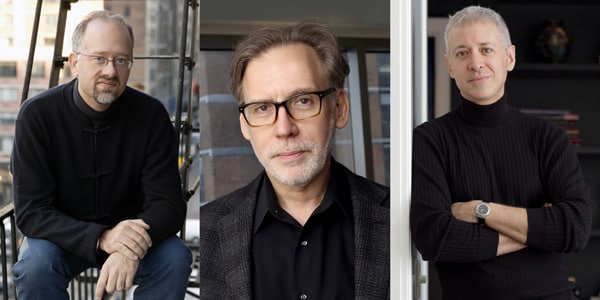
Douglas Mayo had an opportunity after the opening night of Grey Gardens to speak with the shows creators Scott Frankel (Music), Michael Korie (Lyrics) and Doug Wright (Book) to discuss the show and get their thoughts on the current production at Southwark Playhouse.
On the morning I spoke to the creators, the first of many 5 star reviews had started to come in for the production and the team were elated.
Not many people know that Grey Gardens was the first musical ever to be adapted from a documentary. How did you go about tackling the adaptation to make it work for a musical theatre stage?
DW: When they first approached me, I told both Scott and Michael, this it was an absurd premise
MK: And disrespectful!
DW: I said the film is brilliant. I revere it. Any attempt to translate it for the theatre will make it an exercise in artifice. What makes Grey Gardens the documentary profound is that it is Cinéma vérité.
Scott who is very cagey and very wise, said to me why don’t you come back next week and tell us again why it’s such a hair-brained idea. So I did. I said – there’s no narrative. In the theatre you need a beginning, a middle and an end. Later, Michael and Scott were lunching and they had a rather revelatory moment.
MK: When Scott focuses on a subject he’s almost Talmudic, he obsesses about it night and day. He was trying to work out how to get Doug to write the book, as he felt that Doug was the perfect playwright for this. We were in a restaurant for lunch that had a paper tablecloth and a crayon so children can draw. Scott drew two boxes and said “look at that!”. I got it, Act One was the past, Act Two was the Seventies and the space between the two boxes was all of the things that had happened in between. I said let’s show Doug, so we took the tablecloth off to show him and he had the same reaction.
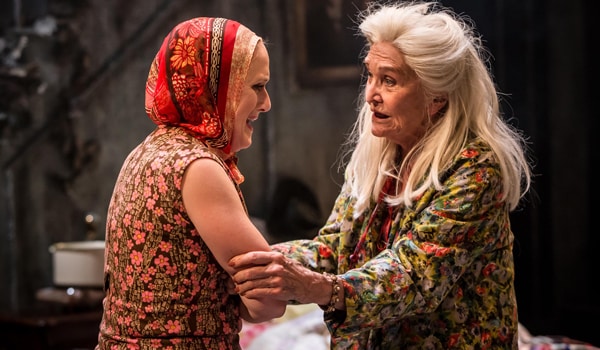
DW: By splitting it up into the 40’s and the 70’s I saw causality that I didn’t see in the documentary as brilliant as it is. I suddenly could sense a narrative shape. For me as a writer it gave me a chance to fashion a first act from the world of Philip Barry and a second act (I hope) that owes something to the mad poetry of Samuel Beckett.
MK: We talked for ages about the story. Edith’s love of singing became one aspect that became crucial to the storytelling. When we discovered that Little Edie had gone on dates with Joe Kennedy Jnr, we thought well what if it had gone a little further and they had become engaged, then there might have been an engagement part which Big Edie might have tried to hijack. Thus the story evolved.
SF: The architecture is tricky and unusual. Doug has done another documentary to musical adaptation since we did this.
Whilst it does have a feeling that it’s a bit more modern, in some ways it does take a little bit of getting used to, because it does flow back and forth in time a lot and it doesn’t always answer all the questions.
DW: Early in our process we would sometime side with Little Edie or take on Big Edie’s point of view. We sat down with Albert Maizels who made the documentary and he gave us a cautionary bit of advice, which was “Don’t blame either character. You must never forget that at it’s core this a mother-daughter love story. That was extra-ordinarily generous thing for him to say and it did become emblazoned on our brains. We knew that if we ever came down too hard on one character at the expense of the other we really weren’t doing them justice.
SF: When I first saw the film I thought it was about an over-bearing narcissistic mother who lived in a hot house environment called Grey Gardens which worked really well for her and her gay accompanist, but not nearly as well for her daughter. I have also come to see that it is that but it’s also the story of a generous and caring mother who provided safe haven for a daughter who is unable to function out in the world.
MK: Big Edie wouldn’t sell the house when there was no money for that exact reason because she would have been thrown into an institution.
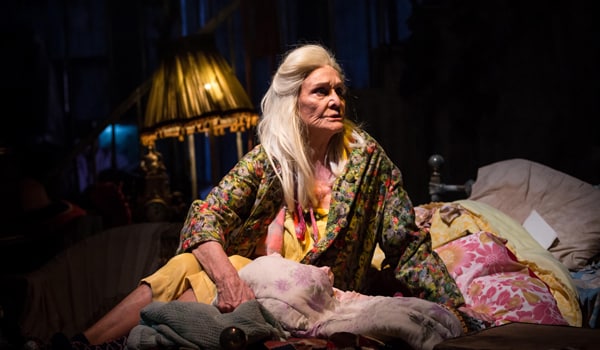
The inhabitants of Grey Gardens are two of the most extraordinary characters in musical theatre. At the end of Act One Little Edie leaves Grey Gardens but by the start of Act Two thirty years later she’s back. It set’s up some interesting moments between mother and daughter doesn’t it?
SF: In the first act she’s able to get out at the end and at the end of the second act she’s on the verge of leaving again and can’t.
MK: We explored this and wrote a great deal of the show at Sundance, which is an arts centre on the border of Florida and Georgia in a swamp, a very luxurious swamp.
Doug came into my cabin and said I’ve figured it out – Act One and Act Two are the same, Little Edie tries to leave home and can’t – write a song about it.
DW: I do think the outside world exposed all her limitations, her frailties and pathologies and Grey Gardens nurtured them so she always goes back to the place where she is nurtured even though her mother does seem diabolical at times.
Yes it did look like there was a bit of Momma Rose in there somewhere.
SF: I definitely saw that in this version where the mother in the first act is talking to Joe Kennedy and saying “she’s a natural born performer”. It’s very clear that she is clearly talking about herself.
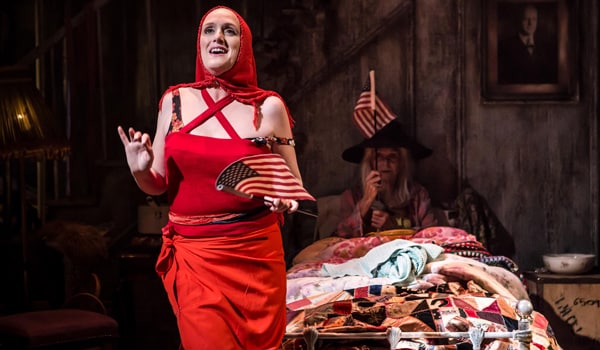
How does this production at Southwark Playhouse compare with other productions you have seen?
SF: We’ve seen the show in Japan and Rio would you believe as well as all over the USA.
MK: I particularly like seeing the show in another country.
How did it play for you in the UK? There’s certainly a better acceptance of eccentricity over here.
SF: Yes, certainly there’s a history of aristocrats in the UK living in country houses without enough money. It’s not unknown here.
DW: We were especially moved to see such formidable talents (Sheila Hancock and Jenna Russell) applied to our material. We all felt that Thom Sutherland really excavated the emotional corners of the material, and bought them to the fore in a really seasoned and incisive way. I think it would be disingenuous to say that all three of us weren’t absolutely dancing on air last night.
It’s a formidable cast. Every single cast member was absolutely sterling. It was really touching.
SF: I spoke to someone who didn’t know the documentary who was here on opening night. They said that particularly in modern society, a lot of things aren’t talked about particularly the psychological dynamics between parents and children. I’ve seen some cast members and their mums. Some are effusive in their praise but others are stoic and withholding. My friend commented that he thought it was fascinating to shine a light on the some of the uglier parts of human behaviour. It doesn’t make them any less human and we all have them, but it was interesting to talk about it and witness things that pointedly aren’t discussed here.
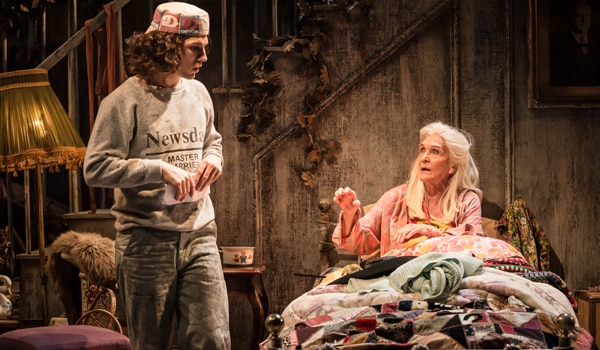
DW: Also the notion that the most tortured and most byzantine relationships are usually almost between a parent and a child.
SF: The best parents let their children be who they are and want to be, and the more complicated parents are unable to disentangle themselves from the child and their own frustrated ambitions and their vision of what the narrative should be in the child’s life.
After you premiered the musical, HBO made their own film adaptation of Grey Gardens with Jessica Lange and Drew Barrymore. What were your thoughts on the film?
SF: I enjoyed the film and both women are particularly good in it. One of the major differences between our show and the HBO film, is that they very pointedly speculate what happened to her in what in our show is the interval. What happens when Little Edie leaves Grey Gardens and goes to New York the first time. There are little clues in the documentary, and there is some speculation that she ‘maybe’ had an affair with a married man that ‘maybe’ went south. The main difference between the two is that we very pointedly did not want to speculate, because we thought it would be richer to not lay a trail of breadcrumbs over the interval. Neither of these two ladies is right and neither is wrong. They are both culpable, they both wrecked and saved each other, and it’s all true. We weren’t trying to play all the angles, that is why Grey Gardens is the perfect title, it’s not back or white it’s grey!
DW: Little Edie’s eccentricities are so Baroque that I don’t think that you can attribute them to any single cause. I think it has to be a combination of the loss of financial freedom, the demands placed upon her psychologically by her mother, a dollop of mental illness, a with-holding father, broken love, and I think it takes a perfect storm to create a personality that extravagant. It’s perhaps a guilty admission that I’ve never watched the HBO movie purely because I felt that I had the remarkable opportunity of dancing with these two extraordinary women, and emotionally I’m not sure I’m ready to see them dancing with another partner. It’s a treat I’m saving for the future.
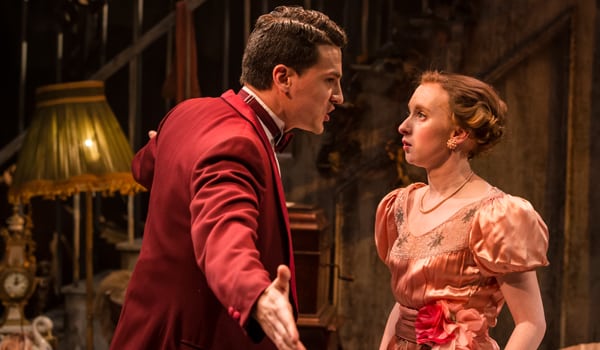
Was I wrong or are their lines of dialogue from the film woven into the musical?
MK: Yes there are. I was very influenced by Little Edie looking at the sky and saying “Another winter, Oh God!”. Doug and I talked about it, I think actually there is a great deal of invention in act two, lines that were not in the documentary that Doug wrote in as dialogue and I took a lot of the actual quotations and put them in the lyrics. So when people say, Act Two is faithful to the documentary – yes and no – really a great deal of it is re-invented by Doug.
SF: Both women spoke in this incredibly intelligent, poetic way. Their turns are phrase are so poetic that they sound scripted they’re so good. They sound so much better than people generally talk in typical conversation and the imagery is so specific that there is great language to excavate.
MK: The Revolutionary Costume is very close to her monologue.
Was there a conscious decision not to use the documentary makers as characters in your adaptation?
SF: We dismissed it very early on. Both women were hungry for an audience and the documentary filmmakers functioned as that audience in the film. We thought we could transpose that in a live theatrical setting where you become the audience. Certainly in act two, it works brilliantly in this space. Living as recluses with the exception of Jerry, perhaps they hallucinated or fantacised about having a larger audience.
MK: James Lapine commented that it was interesting that bother were able to speak to the audience, because what they both wanted was validation that they were right.
SF: The piece connects with women in a very specific way. Women I think identify with the “letting your hair down” qualities of act two. The freedom of being able to not give a damn, of being able to be who they are.
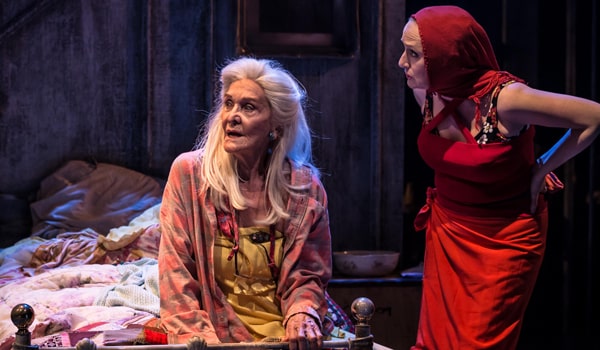
Some creators of musicals have a habit of continuing to tinker with their work years after they have opened. Do you do indulge in that practice?
MK: We did quite a bit of work between Broadway and Broadway and I think the changes we made satisfied us.
DW: I always feel the urge to tinker, but I have a stronger maxim which is there are no perfect plays and musicals but there are many finished plays and musicals I feel that sometimes when you attack a particular subject that sometimes the act of writing is an attempt to satisfy that part of yourself, and then you move on. With each new work I feel like I’m a different writer than the one that came before. I’m not sure if the present writer could go back and zealously re-invent the work of the previous writer. So you need to just trust the work and when you work with two other talents such as these you get a feeling that is strangely satisfying.
SF: I didn’t feel so much the desire to tinker, but seeing this production I did see things in it that I hadn’t seen before and that hadn’t occurred to me. There were certain stylistic choices that Thom made and that the rest of the company made and certain design choices and that I found very exciting.
Was there a particular moment that you liked in this production?
SF: For me the second act echoes, where the characters show up as if in the memory of the two women. I was particularly struck by Joe Kennedy standing as she is trying to leave home and Gould showing up in her bed I loved. It never occurred to me.
DW: I found the fact that the scenic design integrated the two acts that can sometimes feel disparate in a way I had not seen before. It set up the looming darkness of Act Two.
MK: I loved what they did with Brooks. In the scene at the gate Thom dressed Brooks the son as Brooks the butler and you could see the confusion in Little Edie’s face and it put a completely different spin on that scene. I could feel myself inside her mental fog.
SF: The amazing thing for us is that you write something and you are as specific as you can be in the score and in the script. None of us were involved in this project, we had met with Thom and Danielle and I had worked with Jenna and of course Sheila is a living legend, although she doesn’t like to be called that, but then the magic is that someone takes your material and conjures it in their own way and you aren’t there for any of the baking.
Grey Gardens runs at Southwark Playhouse until February 6, 2016.
